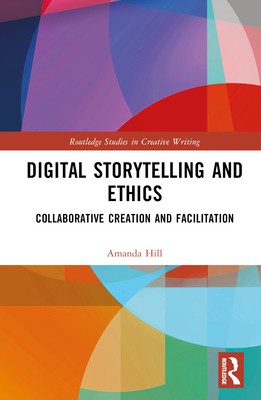
- We will send in 10–14 business days.
- Author: Amanda Hill
- Publisher: Routledge
- ISBN-10: 1032061235
- ISBN-13: 9781032061238
- Format: 15.6 x 23.4 x 1.1 cm, hardcover
- Language: English
- SAVE -10% with code: EXTRA
Reviews
Description
Digital Storytelling and Ethics: Collaborative Creation and Facilitation provides a method for analyzing digital storytelling practices that focuses on the rhetorical, dialogic, co-productive, creative story-making space rather than the finished stories or the technologies.
Looking through a new media lens, Amanda Hill situates the digital storytelling genre and writing practice as a co-creative media process created between writers, storytellers, educators/facilitators, institutions, and the audience, and discusses the inter-relationships within the collaborative writing workshop as well as in those found in the dissemination of the final digital stories. Digital Storytelling and Ethics provides a reflexive look at the responsibility of the facilitator in co-creative digital storytelling writing spaces and makes use of diverse international case studies as examples.
Hill shows that writing educators/facilitators should interpret their roles within the collaborative creation process. This will ensure that responsible facilitation practices based in witnessing guide the storytelling process and create an environment that treats participants as subjects with the ability to respond to the world. This innovative book is an essential read for collaborative digital writers and facilitators.
EXTRA 10 % discount with code: EXTRA
The promotion ends in 16d.23:24:37
The discount code is valid when purchasing from 10 €. Discounts do not stack.
- Author: Amanda Hill
- Publisher: Routledge
- ISBN-10: 1032061235
- ISBN-13: 9781032061238
- Format: 15.6 x 23.4 x 1.1 cm, hardcover
- Language: English English
Digital Storytelling and Ethics: Collaborative Creation and Facilitation provides a method for analyzing digital storytelling practices that focuses on the rhetorical, dialogic, co-productive, creative story-making space rather than the finished stories or the technologies.
Looking through a new media lens, Amanda Hill situates the digital storytelling genre and writing practice as a co-creative media process created between writers, storytellers, educators/facilitators, institutions, and the audience, and discusses the inter-relationships within the collaborative writing workshop as well as in those found in the dissemination of the final digital stories. Digital Storytelling and Ethics provides a reflexive look at the responsibility of the facilitator in co-creative digital storytelling writing spaces and makes use of diverse international case studies as examples.
Hill shows that writing educators/facilitators should interpret their roles within the collaborative creation process. This will ensure that responsible facilitation practices based in witnessing guide the storytelling process and create an environment that treats participants as subjects with the ability to respond to the world. This innovative book is an essential read for collaborative digital writers and facilitators.


Reviews